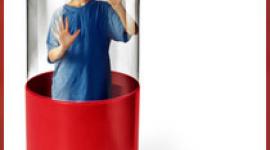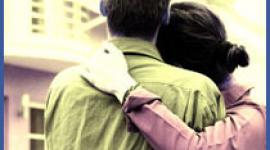Could Anxiety or Panic Disorder Symptoms Be Purely Physical?

Q: I suffer from an anxiety/panic disorder. Of course, this is the diagnosis I have received because there seems to be no other terminology used to describe what I experience. Even though I am quite able to accept that the symptoms I am experiencing are purely physical, I am still treated as though I have a mental illness. My attacks are spontaneous in nature and are characterized by some of the common physical manifestations including rapid heartbeat, trembling, tingling sensations in the left arm, chest pain, etc. Let me emphasize, however, that I do not have any irrational fears or phobias that may subconsciously trigger an attack.
I have read some interesting theories suggesting that prolonged stress may sensitize the central nervous system. Reactions to stimuli become exaggerated. What is your opinion? Do you believe that more research should be done investigating the physical origins of this disease? I know that I am not the only one who is able to discern between real physical sensations and sensations that are a result of a psychosis.
A: Good question! Before we go into a general discussion about the full content of your email there a couple of points we need to clarify first.
1. Panic disorder and the other anxiety disorders are not and have never been considered part of the psychotic illnesses group. Although there is a 'Serious Mental Disorder' category for panic disorder, obsessive compulsive disorder and social anxiety, this category for anxiety disorders acknowledges the serious disabilities associated to these disorders such as agoraphobia (avoidance behavior) major depression etc. Twenty percent of people with panic disorder, 20% of people with OCD and 10% of people with social anxiety fit the criteria for the 'Serious Mental Disorder' category, because they are so disabled as a result of their disorder. Before we had this category, people were not eligible for treatment via our public mental health system, nor were they classified within the general health system. Now with this category at least people can get specialized treatment.
2. It is now recognized spontaneous panic attacks have nothing to do some sort of 'phobic response' either conscious or unconscious. Twenty years ago this was thought to be the case, but not now.
I am like you, as is everyone else we know who has had panic disorder (over 20,000 people now). We all know what we are experiencing is physical, and so do the mental health professionals. We are really experiencing these symptoms - but it is the way we think of the symptoms which causes most of our ongoing problems (i.e. we are having a heart attack, going to die, have a brain tumor, going insane, the doctor has made a mistake, the test results have been mixed up, what if, etc.) This is the psychological factor and the one which is significant in onset of avoidance behavior.
Panic disorder is the fear of having a spontaneous panic attack. Lose the fear of the attack and you lose the disorder, the ongoing anxiety and the disabilities associated to panic disorder. The fear turns on the flight and fight response which only perpetuates our symptoms. Turn off the fight and flight response and all you are left with is the spontaneous panic attacks. Which of course everyone says they don't want to have ever again. But don't give up now, read on.
We have always put forward the fact that something happens to us first then we panic. The problem is people who haven't experienced the spontaneous attack have no idea there is a separation between the 'attack' and the panic. We have an attack and as far as we are concerned panic is a natural normal response to what is happening to us. My psychiatrist used to say 'you are having panic attacks' and I would say 'yes, stop this thing from happening to me and I won't panic.' 'You are anxious' and I would say 'stop this thing from happening to me and I won't be anxious.' He never understood what I meant.
If you are sitting in peak hour traffic and without warning an electric shock rips through your body, your heart rate doubles and you suddenly can't breathe and within a split second you are out of your body looking down at yourself in the car - who wouldn't panic, who wouldn't be anxious? This subtle but most basic point has not ever been acknowledged, as far as we are aware, any where in the literature.
While various drug research puts forward various biological causes and produces drug to fix it, the drugs don't work for all people all of the time. If the reason why we have the spontaneous attacks was found, then the appropriate medication may be developed which would work for everyone all of the time, instead of for just some people, some of the time.
We take the approach that yes something is happening to us physically, something which is not understood, and something which can be incredibly violent as it moves through the body. Many of us feel it as an electric shock, burning heat, intense rushes of energy etc, our heart rate can double, have breathing difficulties, nausea, shaking and trembling, out of body experiences, nothing appears real including ourselves etc. We panic. The fight and flight response is turned on as a result of the panic and our symptoms increase.
We seek medical advice and are told there isn't any physical cause for it happening. i.e. heart problems, brain tumors etc. It is difficult to believe because the experience can be horrific. We fear having another, we fear a mistake has been made and the more we worry the worse we get.
Recovery means we need to lose our fear of what is happening to us. This way we turn off the fight and flight response by turning off the 'what if' and other negative thinking. This is why cognitive behavioral therapy is so important.
The spontaneous attack can be a very violent even when you have lost your fear of them and don't panic. The secret is when you lose your fear of it everything settles down and disappears within 30 -60 seconds. There is no fear, no panic and no anxiety.
For the last few years we have been working with the theory that the ability to dissociate is a major cause of spontaneous panic attacks. This is based upon our own experiences and our own ongoing research.
Yes, yet another theory! But it is one we have found which really fits the experience of our own spontaneous panic attacks and also that of our clients. Working within this framework, we can recover, slowly withdraw from our medication and control the occasional attack by working with our thinking.
As we said, good question.
next: Therapist Stories
~ all articles on insights into anxiety
~ anxiety-panic library articles
~ all anxiety disorders articles
APA Reference
Gluck, S.
(2008, October 4). Could Anxiety or Panic Disorder Symptoms Be Purely Physical?, HealthyPlace. Retrieved
on 2026, January 8 from https://www.healthyplace.com/anxiety-panic/articles/symptoms-purely-physical



